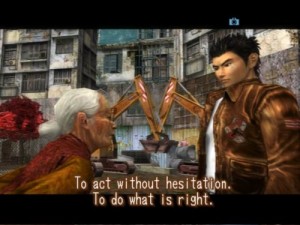
In an unprecedented move, Epic Games will be footing the refund bill instead of the developer.
#Shenmue 3 cancelled full#
Thankfully, Ys Net announced yesterday that PC backers upset by the Epic bait-and-switch would be eligible for full refunds. Some disappointed fans protested for refunds. Suzuki later clarified that Shenmue 3 would eventually come to Steam one year after release. PC backers soon learned the copies they had already pledged for would be issued through Epic, rather than the Steam codes they had been promised.

During the PC Gaming Show at E3, Shenmue 3 was announced as an Epic Games Store exclusive on PC, much to the dismay of some devoted backers. But something unexpected happened during E3 2019, where Ys Net had planned to showcase a new demo of Shenmue 3.

Things were finally looking up for Suzuki and his dream project. The few gameplay screens that emerged in the following years garnered mostly positive feedback, and fans were excited. The campaign was an instant success, eventually earning over $6 million dollars in pledges.

And there was still no word on a new Shenmue. But on June 16, 2015, as if pigs had suddenly learned to fly, Sony announced a Kickstarter campaign for Shenmue 3 at their E3 press conference. Suzuki started his own studio called Ys Net, but he rarely released new games. Shenmue 3 was said to be “totally out of the picture.” In 2007, reports emerged that Shenmue Online, an MMO announced in 2004 as the next entry in the franchise, had been cancelled. The Shenmue 3 Debacleįor over 15 years, fans of the Shenmue franchise received nothing but a short-lived Japan-only mobile game. He eventually left Sega in 2011, after stepping back from his role with the company in 2008. On top of Shenmue’s failure, Suzuki’s career also fell into turmoil. Poor sales left Shenmue 3 in development hell for over a decade. At the time, Shenmue was the most expensive game ever developed, making its failure even more devastating for Sega. In part due to the Dreamcast’s commercial failure, Shenmue and Shenmue 2 flopped, despite the hard work of Suzuki and Sega AM2. Much of the first game consists of fetch quests and slow-moving dialogue sequences with only a handful of battles. Unfortunately, Shenmue hasn’t aged well. It only tells the first chapter of the larger story, and there’s very little action. Sega’s Yakuza franchise would later replicate this formula to greater avail. Shenmue blended a variety of genres, mixing traditional fighting game sequences with quick time events, and peppering the game world with minigames. Designed to model real people, NPCs move around on a 24-hour cycle, living their own simulated lives. Shenmue takes place in a map based on an actual small town in Japan. These concepts would develop into what we know as Shenmue.

Suzuki and his team planned out systems that would make the gameplay as realistic as possible. To achieve this, he set out to craft a single story spanning across multiple games, with a few chapters of that story told in each new entry. Yu Suzuki, the developer who led Sega’s legendary AM2 division for 18 years, wanted to create the most immersive game imaginable. Pioneering the open-world genre while pushing some of the most realistic graphics of its time, Shenmue was on the cutting edge of gaming technology in 1999. Sega released Shenmue for their ill-fated Dreamcast console on Decemto widespread acclaim.


 0 kommentar(er)
0 kommentar(er)
